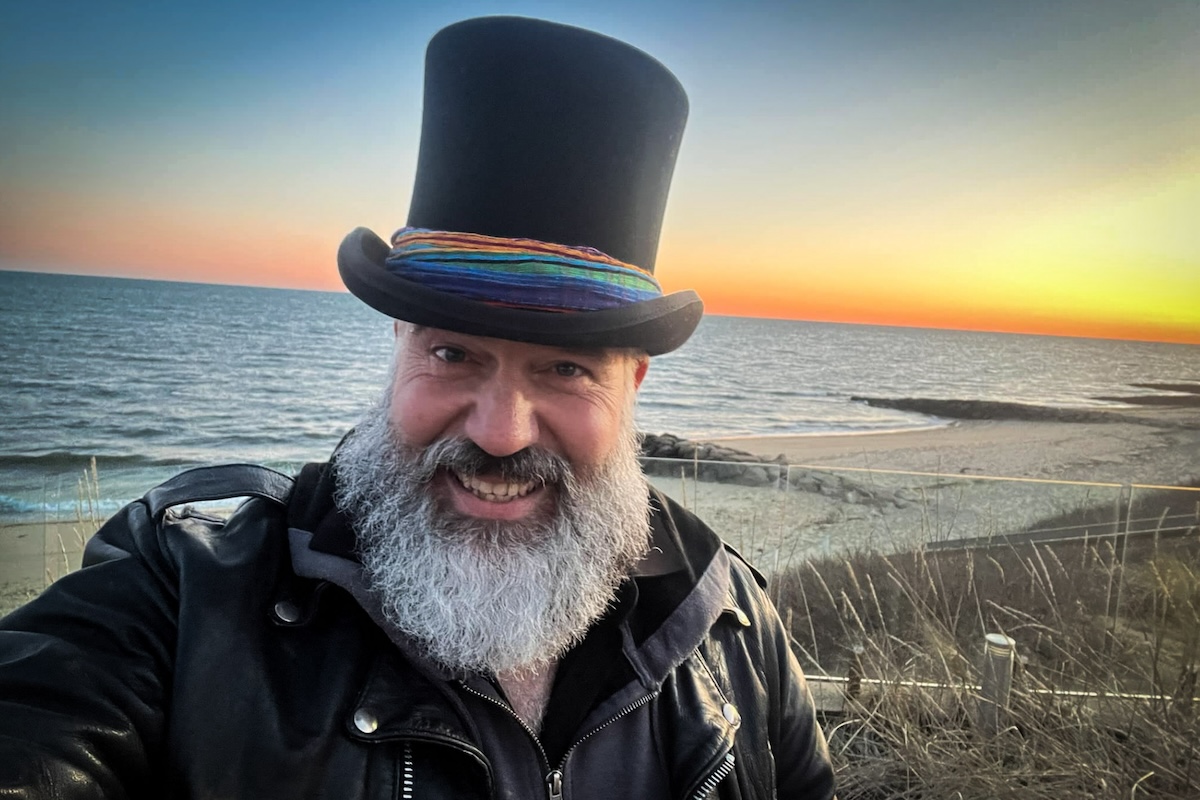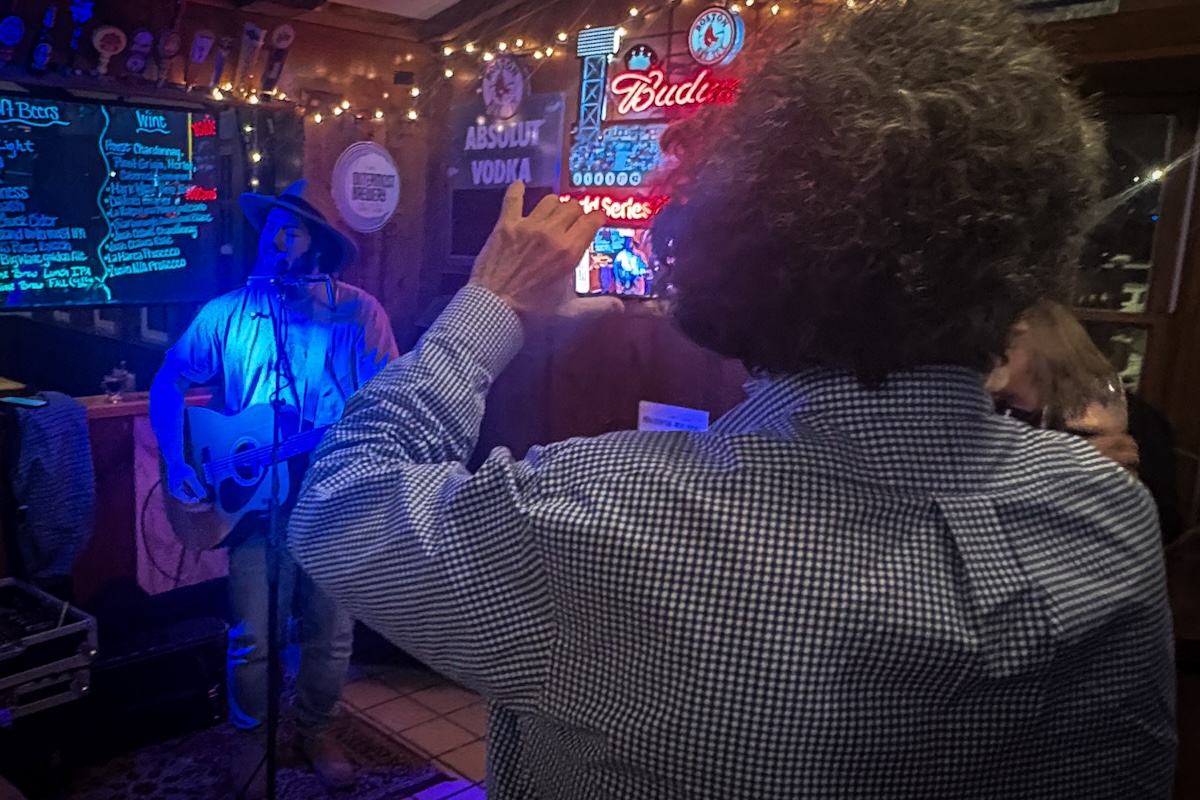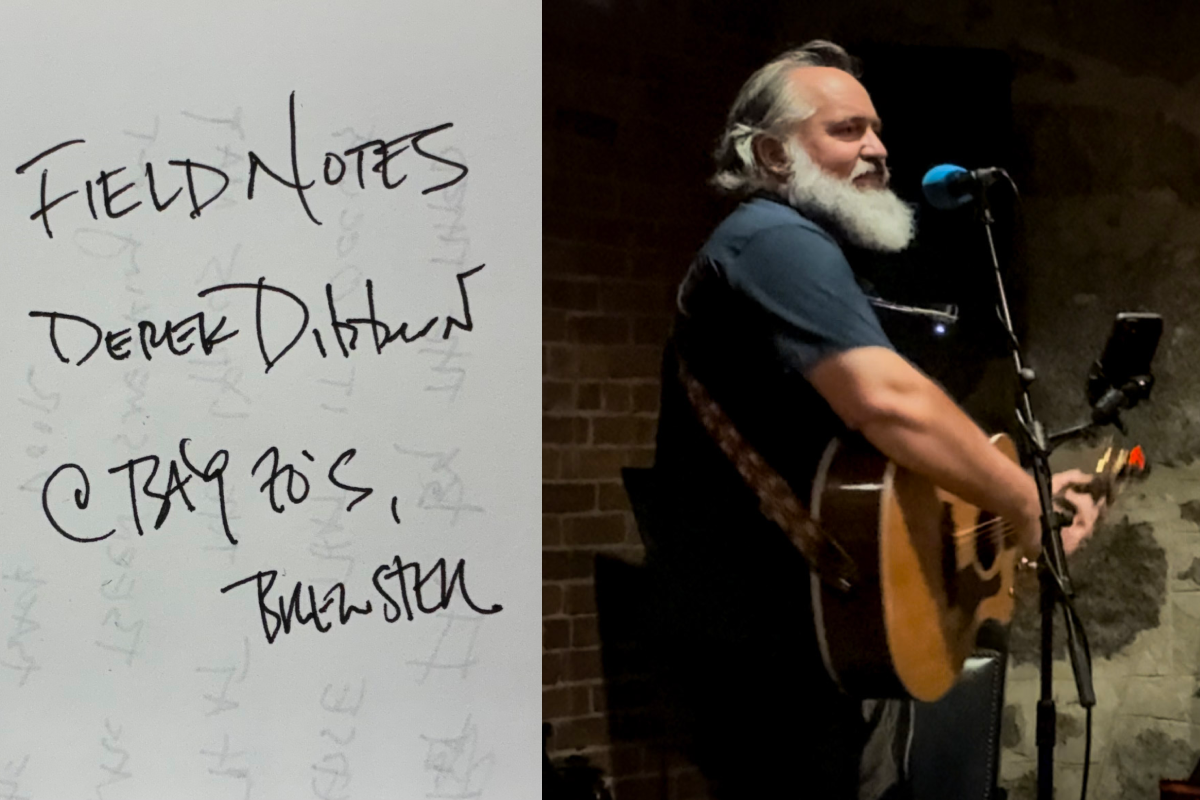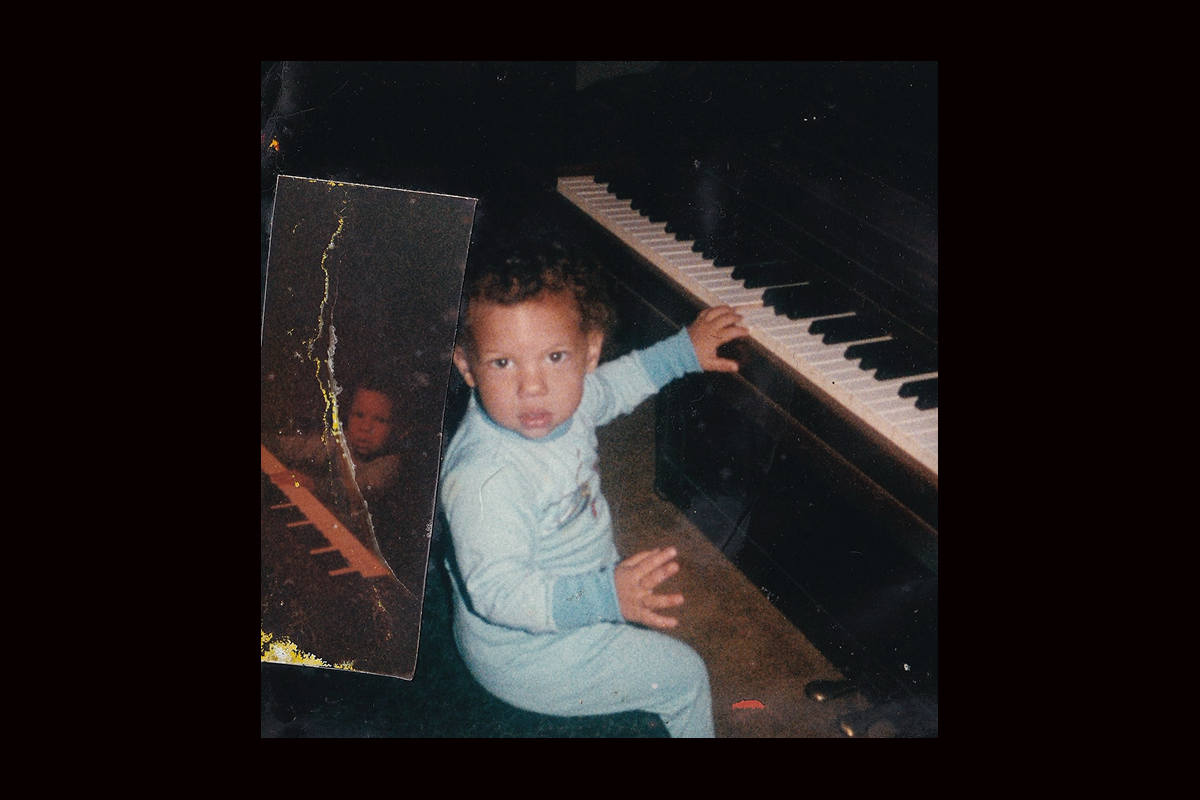Do you play the banjo?
It was the clear speed of the notes. There was a little mariachi to some of those fragments. It was a lot of fun to hear. That was the first time he’d played while the rest of us put away Hazy IPAs and picked through Mean Wedges in Wellfleet.The clean strikes on the notes - it was something that could get lost underneath the wide, rolling vocals. The Nebraska origin comes through like a broadcasters cloak, masking any trace of an accent with its own seasoning. Nebraska is one of those states where announcers in training did their boot camp in the 50s and 60s, scrubbing away any trace of region-speak. (And yes, Derek does play the banjo but claims to not have recently … his honesty may come under scrutiny but white lies can slide.)
Dibbern, on the Cape now for 3 years after a colorful run that started in Marlon Brando’s territory before heading out to Los Angeles, New Jersey, and a nationwide run with what may as well have been the circus (eat your heart out Federico), does fit nicely into the acoustic-guitar-crooner-with-an-harmonica-sidekick box BUT … but when you mute the bartender talking over a customer or a waitress stacking silverware too close to the open kitchen door, there’re a lot of scribbled strokes that fall outside of those four lines. Yes, you’ll get a Springsteen tune, you’ll get your Dylan & your Neil Young fix but you’ll also find more Cat Stevens & Townes Van Zant at one of Derek’s shows than you will at others. And Paul Simon. And especially Tom Waits.
You’ll get your Van Morrison, Jackson Browne, some Dead (or at least some Jerry), but Waits is where Dibbern holds the bulk of his positions. Or it seems that way because of the affection he’s got for the songs, and the regard for the songwriter, who is near to singular in the breadth of his work. You could find something that sounds like Edgar Allan Poe or you could end up near Maryanne-era Leonard Cohen. Derek handles these Waits tunes with attention and real care, like he’s carrying a stack of the finest China from the cabinet in the dining room, through the kitchen, out the front door, and down to the dock - to row it all to heaven in a little row boat. Unbroken.
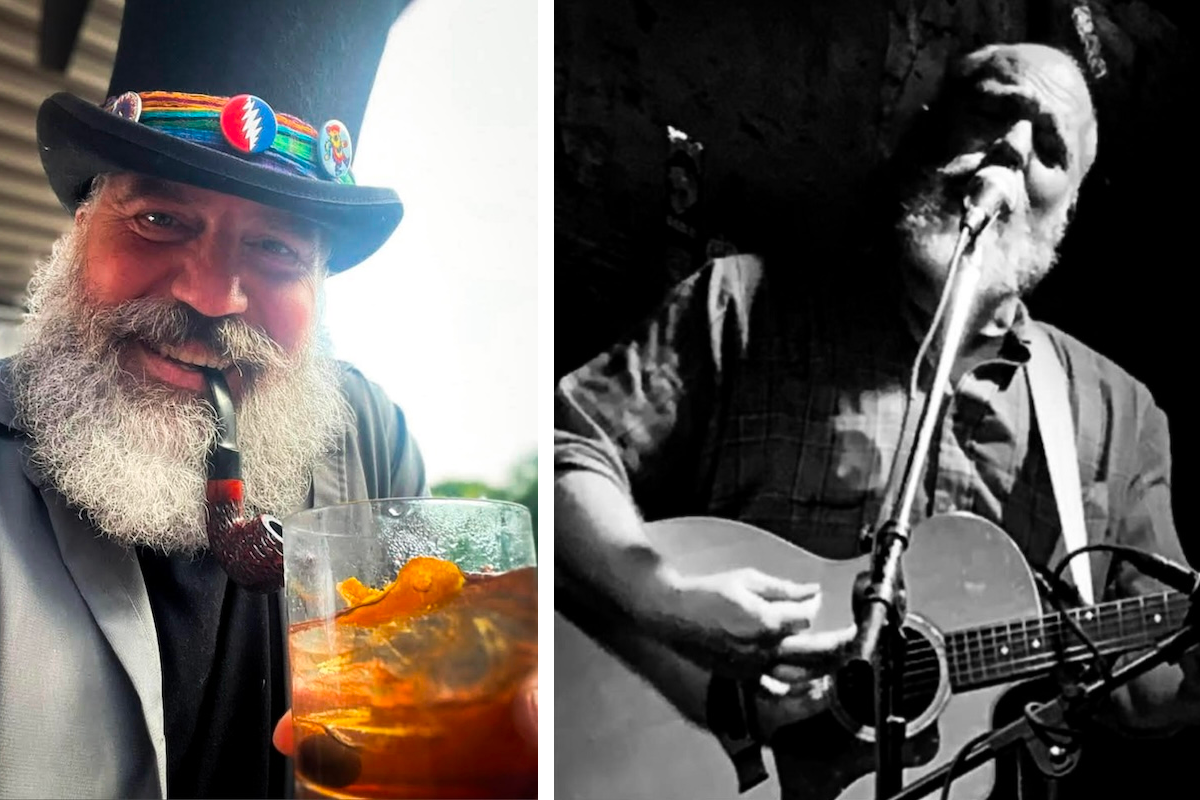
The Underground Ongoing Counter-Culture Culture & Transcendent Connections
When talking to Derek about his covers catalog, the conversation will travel the worn wordy roads of Robert Hunter & Bob Dylan. But we’re also going to bump into Ralph Waldo Emerson and Ken Kesey, so there’s traveling Further. Sal Paradise & Bob Weir had a roommate in-common, bus driver Neal Cassady, along with Allen Ginsberg’s buddy Harry Smith, at whose proverbial feet Jerry Garcia sat in the sunlight.
Derek is happy to get some dirt under his fingernails pulling at the roots of Americana’s Counter Culture, how it ran from the Transcendentalists into the Beats and then the ultimate American off- (or on-) ramp, Bob Dylan.
Similarly to how Neal Cassady was the bridge from Kerouac, Ginsberg & Burrough to Kesey & The Grateful Dead, Dylan ran alongside him, while spending his time with an older, established. Ginsberg, Dylan’s greater (greatest?) impact was what he brought to American Music at large. The charm and quaint nature of the Beat generation (in NYC, the founding names can more or less be counted on one hand with a thumb to spare) was shot out of a cannon when Dylan finished the Song for Woody and started in on Subterranean Homesick Blues.
But where Dibbern really starts to perk up, like a sunflower in timelapse under lamp, is when he delves back a little farther to take his revenge on the Enlightenment with his preferred sword, the Romantics, torn from the stone by Blake and Poe and handed to him to wield pointedly in after-show parking lot conversation and less pointedly from the stage. It’s apparently personal to Derek, the move that Science made to break so definitely from Art, the move the petulant Left brain made away from the Right.
Jumping off from THE MASTER & ITS EMISSARY, Derek’s points are clear as can be if you take the time to look down into that deep well. The positions are interwoven: the Romantic movement (which gave way to The Transcendentalists) was a reaction to the Enlightenment’s forceful stance that the Arts & Sciences (the Right and Left sides of the brain, if you are into the whole brevity thing, man) went to their respective corners. This broke about the wholeness with which the two sides had functioned for thousands of years and gave the Left brain (the verbal side, the categorizer, the details side) some impression it could function without the Right side (the wholistic side, the view from 50,000 feet, the shape & color side).
That perspective created a cultural rift that’s still evident today. This isn’t the place for it (really? Are we sure it’s not?) but there’s a case building that, from a particular view, the Right brain is the human side and the Left brain is the AI side: helpful as a tool, but destructive as the hand that wields it.
The perceived Hippie Dippy-dom of the Right side was targeted by the Left side and as less concrete in this reality, less measurable, less able to be “taught.” So when the factories started coming, the children as chimney sweeps, which Blake saw with crystal clarity, the Right brainers (the artists, the dreamers) were relegated to a small number of categories: Essential Geniuses who are put in a small pen, bound to be geniuses with every spoken word (how’d that work out for Cobain?) or failures (looking at you Van Gogh) which we’ll throw money and reputation at in small numbers while the balance of humanity, the Left siders, are sent to schools and jobs fashioned not only with methods of teaching ruled by the compartmentalized Left brain affinities but also teaching those detail oriented, fragmented subjects.
The Bard Tradition: A Community of Ghosts
Well all of that segmenting pisses Derek off. He really doesn’t believe in the difference between poetry and songs. He doesn’t believe in poetry for the page, only for the tongue. Poems are just songs that haven’t found melody yet.
Another iceberg in the cold ocean of experience by which Dibbern sailed is ship was INVISIBLE REPUBLIC, a book by music critic Griel Marcus that details the recording of Bob Dylan & The Band’s seminal BASEMENT TAPES. Guitarist Robbie Robertson could have summed it up on the head of a pin, “Dylan would pull these songs out of nowhere. We didn't know if he wrote them or if he remembered them. When he sang them, you couldn't tell.”
The preoccupation Blake & Whitman and the other writers and other artists, who had at one time found themselves excited by the potential future the Enlightenment promised, had become disenfranchised and their reaction was to do their level best to re-unify the two sides of the brain, to channel that from without and execute on it using that from within. Robertson’s quote about Dylan can come across trite, “the artist as a channel,” but if it’s true then it’s true and you wonder if it wasn’t the Left brain that tried to make it into a punchline.
The St Augustine maxim that a prayer sung is twice as powerful as one recited jumps out here. Derek doesn’t hesitate when it comes to that part of the conversation: this isn’t about Prayer, it’s about the human tradition of chanting, of singing to the Universe and whatever higher power that resides at the center of your song. For fans of old Westerns like me, who always wondered where those bullets landed when 50 cowboys would unload six-shooters into the night sky at a fiesta in Tucumcari, Derek offers that no prayer or song or chant exists without a home to lay its head.
So be careful in the shower now, ya hear?
Fuckit, Here’s Wonderwall
Raised in North Bend, Nebraska, Derek started really falling in love with music and singing on road trips with his family. Very Gen X-y, they’d pile into a family car and set out with a limited (some would say “select”) collection of cassettes for the ride (Cat Stevens, Van Morrison, Paul Simon … sound familiar?). He’s very firm: there were only 5 or 6 tapes in rotation, period. That puts our guy on track to memorize and master a song and sure enough time to start playing around with delivering some of those lines his own way … what with it being a round trip.
Derek’s high school years were spent in the bubbling metropolis (read: there was a Taco Bell) of Freemont, NE. This is where things started to open up for him: he got involved with the drama department & choir. A couple essential influences are born then from the two folks who ran those respective programs: they saw something in Derek that they didn’t see in a lot of students. Yes, he had some innate talent but he also had the courage to stretch out and take some creative risks because he didn’t care about whatever potential embarrassment that could befall him. This is what stops so many talents before they get out of the blocks.
Derek was far more interested in the halftime show than he was interested in 3rd & 5. And so was everybody else in those programs, that’s when he found his people - or his people found him. Shortly after, his older brother guided him toward what to listen to—and, eventually, play. There was Pink Floyd, there was Bob Dylan, and the first thing he learned on the instrument was Neil Young's After The Gold Rush.
There was also the involvement in Lutheran Youth trips - a little churchy sounding for some but those jaunts put him on the road. The trips would stretch from Nebraska to Massachusetts with stops along the 20+ hour trip at campgrounds where the nightly fires practically begged Derek and his guitar to step out and show off the wares. Which he happily did. Halftime shows, right?
A Carney with Good PR
After graduating high school he went West and dipped a toe in the water at the American Academy of Dramatic Arts in Pasadena (outside of LA) for a semester. But Derek skipped out of southern California and back to Nebraska due to the overwhelming levels of plasticity detected in the industry toward which he was headed. Meaning that regardless of the lifelong friends he was able to make & hold close, LA can also give off the Network-First energy that repelled our young Bard. So he skipped out, back to the Heartland where his sanity sat, still perfectly intact.
He wasn’t there long before he got back in touch with Denise, a woman he’d dated back on Pacific time. She was now living in New Jersey. Just before they were set for a romantic Midwestern meet cute to figure out if they were going to work on figuring it out, she landed a job touring the country with Sesame Street Live and had to push their reunion.
When they did have time to get together the next year, it was a three week trip to Mexico. True to his road trip roots, Derek drove them down and was set to drop Denise off in Minnesota with the Sesame Streeters for their next tour on the return. En route from Mexico to Minnesota, they stopped into their first Rainbow Gathering and, by the time they joined the troop in Minny, Derek had decided that, once Denise’s wagon pulled off, he’d start playing shows and making his way through that lifestyle and, as a young guy in his 20s, it was an adventure he was ready for.
But synchronicity had other plans. As he was saying his goodbyes to young Denise, a guy from concessions, storming around the grounds as they were loading in the green Grouch, complained that one of his workers hadn’t shown up and they were going to be on the road indefinitely minus one. He turned to Derek, “You want a job, kid?”
He did. That’s how Yung Dibbern ended up run-off with the circus.
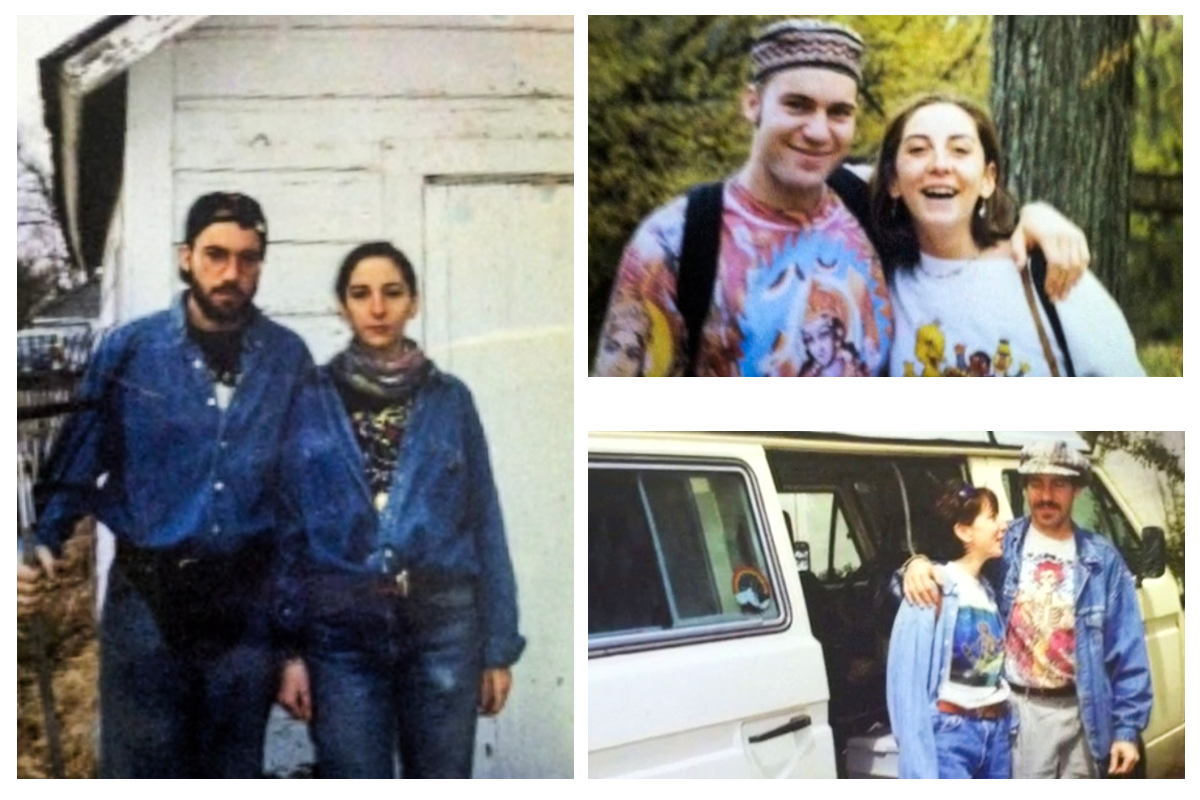
Over the next 10 years, they hit a city or two each week, Denise voicing Oscar or Elmo, Derek selling balloons and popcorn. As they hit the various town, the folks in the troop with him would find Open Mic nights or book small gigs and stay sharp performing on their own. This was an Americana we’ve likely thought was dead by the 90s but here was Derek carrying on the legacy in his own way: complete with Bard & Beat influences strong enough to put a smile on Robert Hunter’s face.
Flyin Mother Nature’s Silver Seed to a New Home in the Sun
Denise and Derek got married after their decade with Big Bird’s traveling troop and settled back in Nebraska, raising their daughter Ella in Lincoln. After Ella graduated and shoved off to UVM, Derek & Denise were in the enviable spot to move around once again. Denise’s father was down Speedway 6 and across the bridge in Plymouth, and Plymouth is a whole helluva lot closer to Burlington, VT than Lincoln so the two formers gypsies mobilized once again and resettled themselves out here in the Dennis area where they are now.
Derek immediately recognized the live music scene that Mass offered and was playing out in short order. One things usually leads to another and, after Denise met Natalia Bonfini, whose Bonfini Entertainment books artists all over the Cape, it was barely a matter of time before Derek found someone to get him seen and heard and playing outfrom Sandwich to Wellfleet.
His shows feel like a conversation between Derek and the ghosts of Whitman, Dylan, and Waits—a tradition of song and story. His voice never fails, the tunes, when he’s doing them right, will present themselves to him for air time, so you’re going to bump into some old and new catalog covers and, if you’re in the right place on the right night, there’s an original or two that’ll find its way home.
Because every song does.
•••
Find, follow, friend, the man himself on Facebook & Instagram where he lists his show dates & venues.
Clap Hands!

